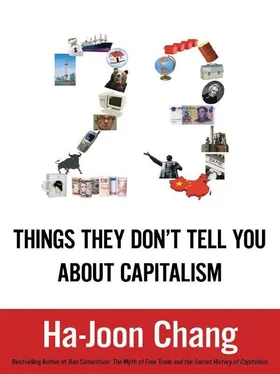23 Things They Don’t Tell You about Capitalism by
Ha-Joon Chang
23 Things They Don’t Tell You about Capitalism
HA-JOON CHANG

To Hee-Jeong, Yuna, and Jin-Gyu
7 Ways to Read 23 Things They Don’t Tell You about Capitalism
Way 1. If you are not even sure what capitalism is, read: Things 1, 2, 5, 8, 13, 16, 19, 20, and 22
Way 2. If you think politics is a waste of time, read: Things 1, 5, 7, 12, 16, 18, 19, 21, and 23
Way 3. If you have been wondering why your life does not seem to get better despite ever-rising income and ever-advancing technologies, read: Things 2, 4, 6, 8, 9, 10, 17, 18, and 22
Way 4. If you think some people are richer than others because they are more capable, better educated and more enterprising, read: Things 3, 10, 13, 14, 15, 16, 17, 20, and 21
Way 5. If you want to know why poor countries are poor and how they can become richer, read: Things 3, 6, 7, 8, 9, 10, 11, 12, 15, 17, and 23
Way 6. If you think the world is an unfair place but there is nothing much you can do about it, read: Things 1, 2, 3, 4, 5, 11, 13, 14, 15, 20, and 21
Way 7. Read the whole thing in the following order . . .
Introduction
Thing 1 There is no such thing as a free market
Thing 2 Companies should not be run in the interest of their owners
Thing 3 Most people in rich countries are paid more than they should be
Thing 4 The washing machine has changed the world more than the internet has
Thing 5 Assume the worst about people and you get the worst
Thing 6 Greater macroeconomic stability has not made the world economy more stable
Thing 7 Free-market policies rarely make poor countries rich
Thing 8 Capital has a nationality
Thing 9 We do not live in a post-industrial age
Thing 10 The US does not have the highest living standard in the world
Thing 11 Africa is not destined for underdevelopment
Thing 12 Governments can pick winners
Thing 13 Making rich people richer doesn’t make the rest of us richer
Thing 14 US managers are over-priced
Thing 15 People in poor countries are more entrepreneurial than people in rich countries
Thing 16 We are not smart enough to leave things to the market
Thing 17 More education in itself is not going to make a country richer
Thing 18 What is good for General Motors is not necessarily good for the United States
Thing 19 Despite the fall of communism, we are still living in planned economies
Thing 20 Equality of opportunity may not be fair
Thing 21 Big government makes people more open to change
Thing 22 Financial markets need to become less, not more, efficient
Thing 23 Good economic policy does not require good economists
Conclusion: How to rebuild the world economy
Acknowledgements
Notes
The global economy lies in tatters. While fiscal and monetary stimulus of unprecedented scale has prevented the financial melt-down of 2008 from turning into a total collapse of the global economy, the 2008 global crash still remains the second-largest economic crisis in history, after the Great Depression. At the time of writing (March 2010), even as some people declare the end of the recession, a sustained recovery is by no means certain. In the absence of financial reforms, loose monetary and fiscal policies have led to new financial bubbles, while the real economy is starved of money. If these bubbles burst, the global economy could fall into another (‘double-dip’) recession. Even if the recovery is sustained, the aftermath of the crisis will be felt for years. It may be several years before the corporate and the household sectors rebuild their balance sheets. The huge budget deficits created by the crisis will force governments to reduce public investments and welfare entitlements significantly, negatively affecting economic growth, poverty and social stability – possibly for decades. Some of those who lost their jobs and houses during the crisis may never join the economic mainstream again. These are frightening prospects.
This catastrophe has ultimately been created by the free-market ideology that has ruled the world since the 1980s. We have been told that, if left alone, markets will produce the most efficient and just outcome. Efficient, because individuals know best how to utilize the resources they command, and just, because the competitive market process ensures that individuals are rewarded according to their productivity. We have been told that business should be given maximum freedom. Firms, being closest to the market, know what is best for their businesses. If we let them do what they want, wealth creation will be maximized, benefiting the rest of society as well. We were told that government intervention in the markets would only reduce their efficiency. Government intervention is often designed to limit the very scope of wealth creation for misguided egalitarian reasons. Even when it is not, governments cannot improve on market outcomes, as they have neither the necessary information nor the incentives to make good business decisions. In sum, we were told to put all our trust in the market and get out of its way.
Following this advice, most countries have introduced free-market policies over the last three decades – privatization of state-owned industrial and financial firms, deregulation of finance and industry, liberalization of international trade and investment, and reduction in income taxes and welfare payments. These policies, their advocates admitted, may temporarily create some problems, such as rising inequality, but ultimately they will make everyone better off by creating a more dynamic and wealthier society. The rising tide lifts all boats together, was the metaphor.
The result of these policies has been the polar opposite of what was promised. Forget for a moment the financial meltdown, which will scar the world for decades to come. Prior to that, and unbeknown to most people, free-market policies had resulted in slower growth, rising inequality and heightened instability in most countries. In many rich countries, these problems were masked by huge credit expansion; thus the fact that US wages had remained stagnant and working hours increased since the 1970s was conveniently fogged over by the heady brew of credit-fuelled consumer boom. The problems were bad enough in the rich countries, but they were even more serious for the developing world. Living standards in Sub-Saharan Africa have stagnated for the last three decades, while Latin America has seen its per capita growth rate fall by two-thirds during the period. There were some developing countries that grew fast (although with rapidly rising inequality) during this period, such as China and India, but these are precisely the countries that, while partially liberalizing, have refused to introduce full-blown free-market policies.
Thus, what we were told by the free-marketeers – or, as they are often called, neo-liberal economists – was at best only partially true and at worst plain wrong. As I will show throughout this book, the ‘truths’ peddled by free-market ideologues are based on lazy assumptions and blinkered visions, if not necessarily self-serving notions. My aim in this book is to tell you some essential truths about capitalism that the free-marketeers won’t.
Читать дальше







![Ally Carter - [Gallagher Girls 01] I'd Tell You I Love You But Then I'd Have to Kill You](/books/262179/ally-carter-gallagher-girls-01-i-d-tell-you-i-lo-thumb.webp)





